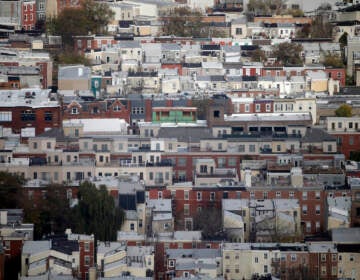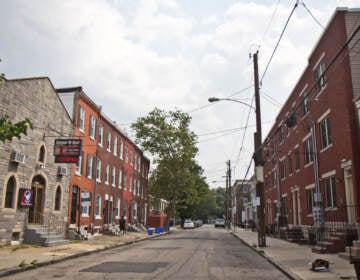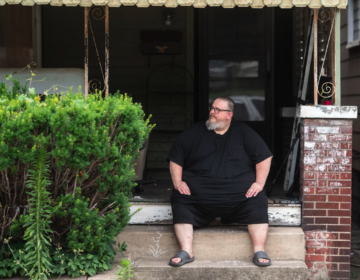Data highlights racial disparities in mortgage lending at TD Bank in Philly region
Between 2018 and 2020, TD bank denied a higher percentage of Black applicants seeking residential mortgage loans than white applicants.

Rowhouses in North Philadelphia. (Emma Lee/WHYY)
New data flags one of the area’s top banks for having a troubling track record when it comes to approving residential mortgage loans for Black applicants.
The numbers show that, compared to a group of peer institutions, TD Bank tied for the lowest approval rate for Black applicants seeking to buy homes in the Philadelphia region. TD Bank also had the biggest gap in denial rates — nearly 20 percentage points — when comparing Black and white applicants.
The data, crunched by the Reinvestment Fund and presented Thursday during a public hearing co-hosted by the Federal Reserve Bank, also shows that TD Bank was more likely to approve a mortgage loan for a low-income white applicant than a high-income Black applicant during the same period.
“That certainly is an indication that there’s a problem here,” said Ira Goldstein, president of the policy solutions group for the Reinvestment Fund.
The data defines low income as less than 80% of the area’s median income. For a family of four, that translates to $84,300 a year.
High income is defined as earning at least 120% of AMI. That translates to $126,480 a year for a family of four.
In a statement, TD Bank spokesperson Kathleen Toy said the institution does not “deny mortgages or any other products or services based on race, ethnicity or membership in any other protected class.” She said the bank has taken steps to diversify its mortgage customer base.”
“We recognize that we need to be part of the solution. Over the course of 2021 and 2022, we implemented several initiatives, changes and new products that have already shown improvement in our efforts to diversify our customer base and enhance our ability to provide mortgage loans and home lending options to all borrowers,” said Kathleen Toy.
Between 2018 and 2020, the institution denied 20% of all purchase mortgages, but denied nearly 40% of all Black applicants, according to the data, which was culled from the national reporting system that’s part of the Home Mortgage Foreclosure Act.
The denial rate among white applicants was 20%.
Data for PNC Bank, another top bank in the region, revealed a similar gap when comparing Black applicants and white applicants.
“These disparities in mortgage lending are actually about a whole lot more than just disparities in mortgage lending. People come to these transactions with less experience. They come to them with less accumulated wealth. They come to them with less propensity to have intergenerational wealth transfer,” said Goldstein.
Overall, Black mortgage applicants in Philadelphia were nearly three times more likely to be denied by lenders than white applicants in 2020, according to an analysis done by the Federal Reserve Bank of Philadelphia.
The report, released last December, posited that Black mortgage applicants struggle with lenders because of limited credit histories, low credit scores, and what experts refer to as high debt-to-income ratios.
The authors also highlighted the ongoing impact of redlining, a discriminatory practice dating back to the 1930s that saw mortgage lenders deny loan requests based on race.
Thursday’s public hearing focused on TD Bank’s proposed merger with Tennessee-based First Horizon Bank.
Rachel Labush, an attorney with Community Legal Services, referenced the data while calling on regulators to require TD Bank to increase access to mortgage lending and homeownership for “Black and brown borrowers in underserved neighborhoods” in Philadelphia and around the country.
“We want to highlight these disparities because instead of exacerbating the problem, TD Bank should be part of the solution,” said Labush.
WHYY is your source for fact-based, in-depth journalism and information. As a nonprofit organization, we rely on financial support from readers like you. Please give today.










